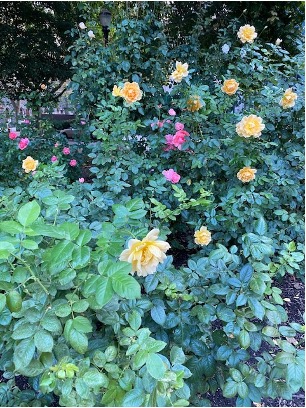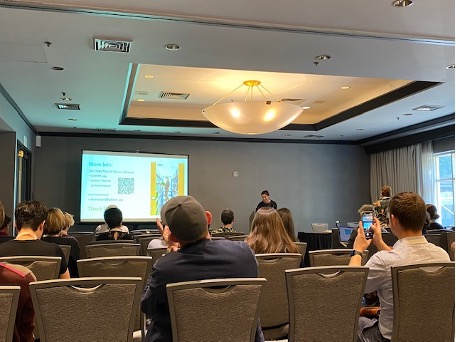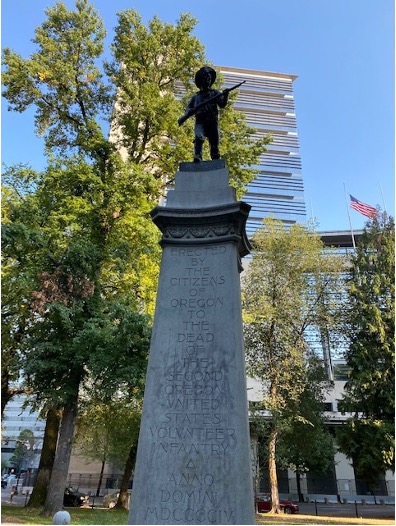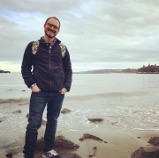Written by 2022 Wanda Chin Scholarship Recipient Christopher Olsen
 Arriving in Portland the day before the WMA Annual Conference, I was unsure what to expect from the three-day event. I recently finished my Certificate in Museum Studies from the University of Washington a few months prior, and had been struggling for months to pivot from a 10 year career in early childhood education to one in the museum field. My goal going into the conference was to to learn more about the current trends and happenings in the museum world and to learn more about the various sectors of museum work. Receiving the Wanda Chin Scholarship to attend the conference was such an honor, and I am so grateful to have been able to attend the annual conference.
Arriving in Portland the day before the WMA Annual Conference, I was unsure what to expect from the three-day event. I recently finished my Certificate in Museum Studies from the University of Washington a few months prior, and had been struggling for months to pivot from a 10 year career in early childhood education to one in the museum field. My goal going into the conference was to to learn more about the current trends and happenings in the museum world and to learn more about the various sectors of museum work. Receiving the Wanda Chin Scholarship to attend the conference was such an honor, and I am so grateful to have been able to attend the annual conference.
The Opening Keynote by Mountaintop Vision’s Dina Bailey was a great way to kick-off the conference. One of the statements that most stuck with me from her presentation was the idea that stories stay and lessons leave. What lessons would I leave the WMA 2022 Annual meeting having learned?
Lesson #1 - Learn From and Lean on Your Peers
 One of the first panels I attended was Building Community: Discovering Resources for Professional Support, Learning, and Development hosted by the Museum Educators of Puget Sound. This panel highlighted for me the importance of connecting with your peers and developing a network of support in your work. The Museum Educators of Puget Sound host an event called TinkerTime, where participants brainstorm with other museum educators and can receive help developing programs or ideas for their institutions. Learning from and with your peers to help advance educational programming within their museums.
One of the first panels I attended was Building Community: Discovering Resources for Professional Support, Learning, and Development hosted by the Museum Educators of Puget Sound. This panel highlighted for me the importance of connecting with your peers and developing a network of support in your work. The Museum Educators of Puget Sound host an event called TinkerTime, where participants brainstorm with other museum educators and can receive help developing programs or ideas for their institutions. Learning from and with your peers to help advance educational programming within their museums.
Lesson #2 - Center the Well-Being of your Staff and Community
A highlight of the WMA Annual Conference was attending the panel Weaving a Net(work) of Care for Oceanic Collections. Panelists discussed the Native Hawaiian Pacific Islander Museum Institute, which provided professional development to 20 Native Hawaiian and Pacific Islander early- to mid-career museum professionals. As described on their website:
 “The Oceanic collections that these professionals care for tell important stories about Pacific peoples and their contributions to the United States and the world. Unfortunately, opportunities for professional development are few and far between, and even when they are offered, they do not often align to the needs, values, and cultural practices of these diverse communities. This institute sought to provide education, training, and support through a collaborative process that was responsive to regional, institutional and participant needs, as well as Indigenous notions of care.”
“The Oceanic collections that these professionals care for tell important stories about Pacific peoples and their contributions to the United States and the world. Unfortunately, opportunities for professional development are few and far between, and even when they are offered, they do not often align to the needs, values, and cultural practices of these diverse communities. This institute sought to provide education, training, and support through a collaborative process that was responsive to regional, institutional and participant needs, as well as Indigenous notions of care.”
The panel wrapped up with participants sharing what they had learned about Indigenous notions of care. They highlighted the importance of having indigenous folx teaching other indigenous folx, the importance of thoughtfulness, care, and intention in museum practice, and the importance of treating each person like family. I left this panel feeling uplifted and grateful that this program exists.
In another panel, From Visitor Experience to Community Experience: Centering Well-being and Welcome from the Inside Out, a question that kept coming up was: How do you center well-being in your organization? How are museums emphasizing the well-being of their staff and their communities? While this is something that each museum will need to answer for itself, this panel highlighted for me the importance of empathy and nurturing pro-social behaviors. How can museums center themselves as agents of empathy in our current socio-political climate?
Lesson #3 - “Persisting and Resisting”
Another highlight of the conference was the panel titled Facilitating Critical Conversations around Exhibitions. These panelists, many of them museum educators, highlighted the ways museums can help extend thinking and foster conversation through exhibitions and education. A variety of ways to facilitate these critical conversations were highlighted including: adding complexity to extend thinking and reflection, crafting curious questions, and recognizing when your community is ready for conservation and action. One statement that resonated with me was this: “Civic engagement is a marathon, not a sprint. The work you are doing is for future generations, not the present.”
Leaving Portland on Sunday, at the close of the conference, I felt rejuvenated and empowered to continue searching for roles in the museum field. I left the conference with many lessons learned and also with many more questions to ponder and reflect on. The museum field is ever growing and expanding, and it is up to all of us who work or volunteer in museums to keep moving Forward.
 Christopher Olsen was a 2022 Wanda Chin Scholarship recipient. A recent graduate of the University of Washington’s Certificate in Museum Studies program, he works as a Waldorf educator in a Birth to 5-year-old program. He is also a volunteer at the Seattle Aquarium, where he centers empathy and connection with the natural world in his work with the public.\
Christopher Olsen was a 2022 Wanda Chin Scholarship recipient. A recent graduate of the University of Washington’s Certificate in Museum Studies program, he works as a Waldorf educator in a Birth to 5-year-old program. He is also a volunteer at the Seattle Aquarium, where he centers empathy and connection with the natural world in his work with the public.\
Add new comment